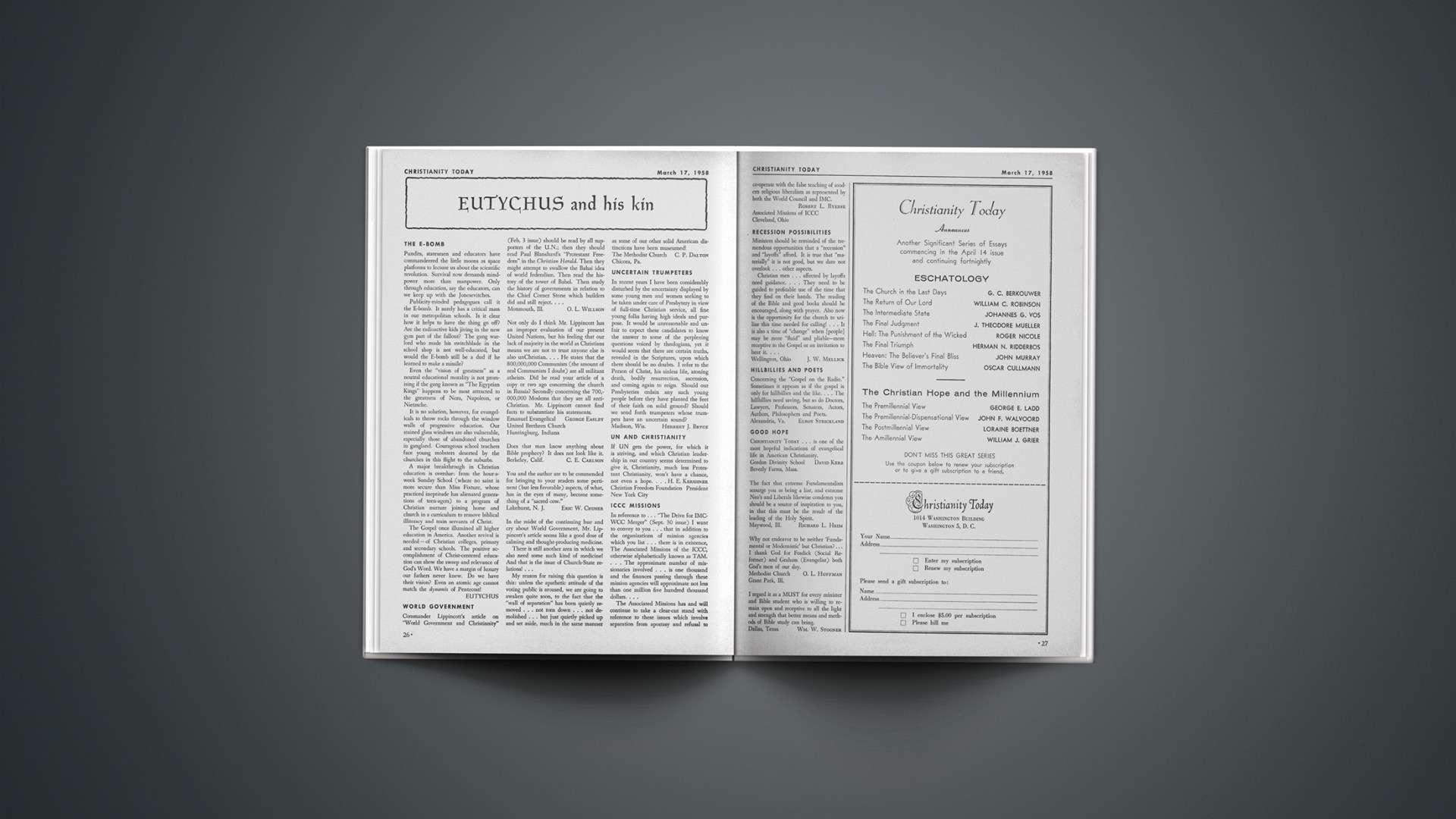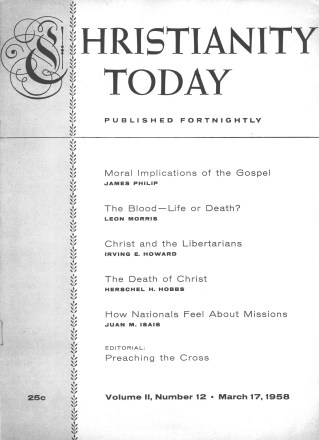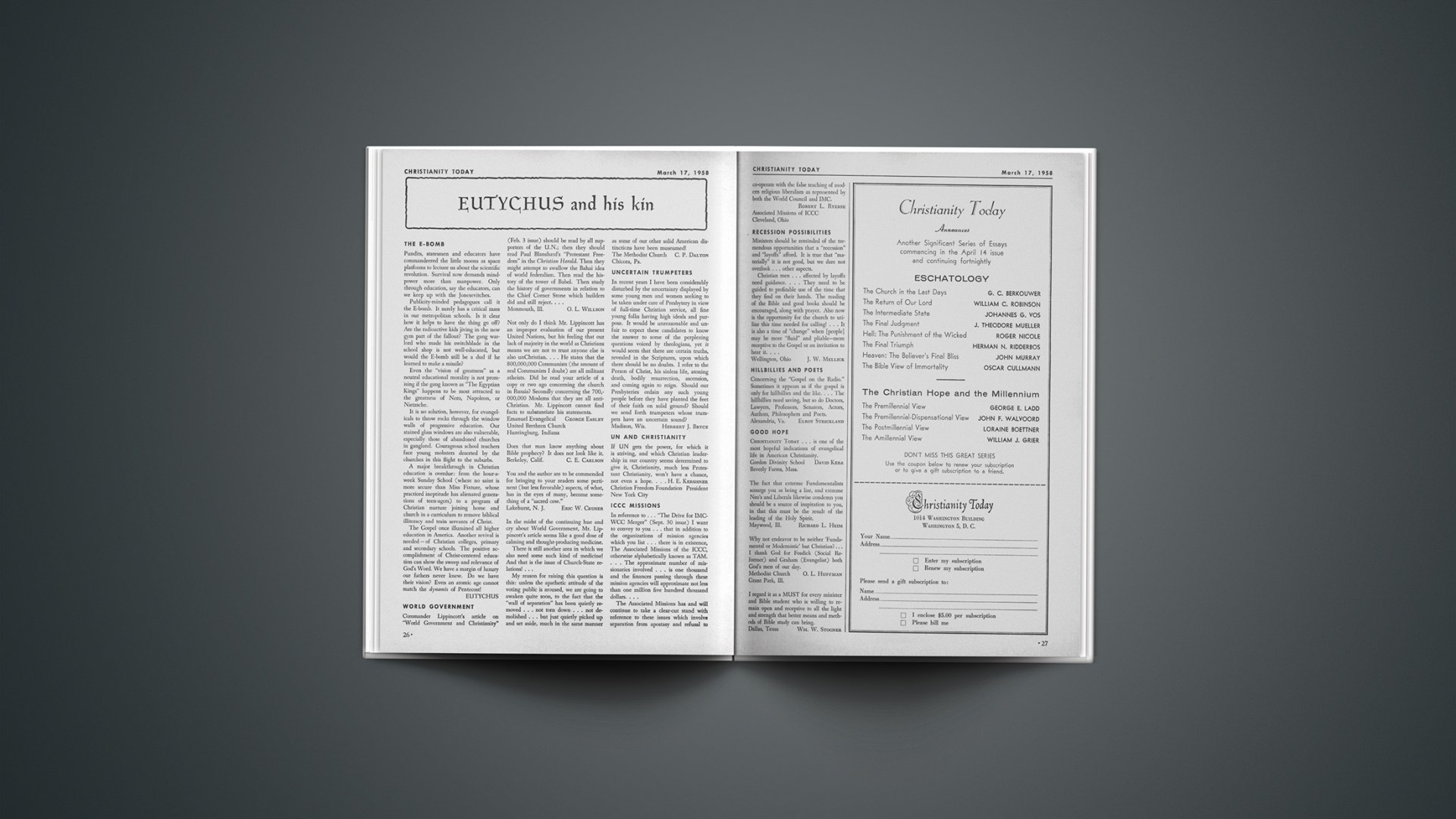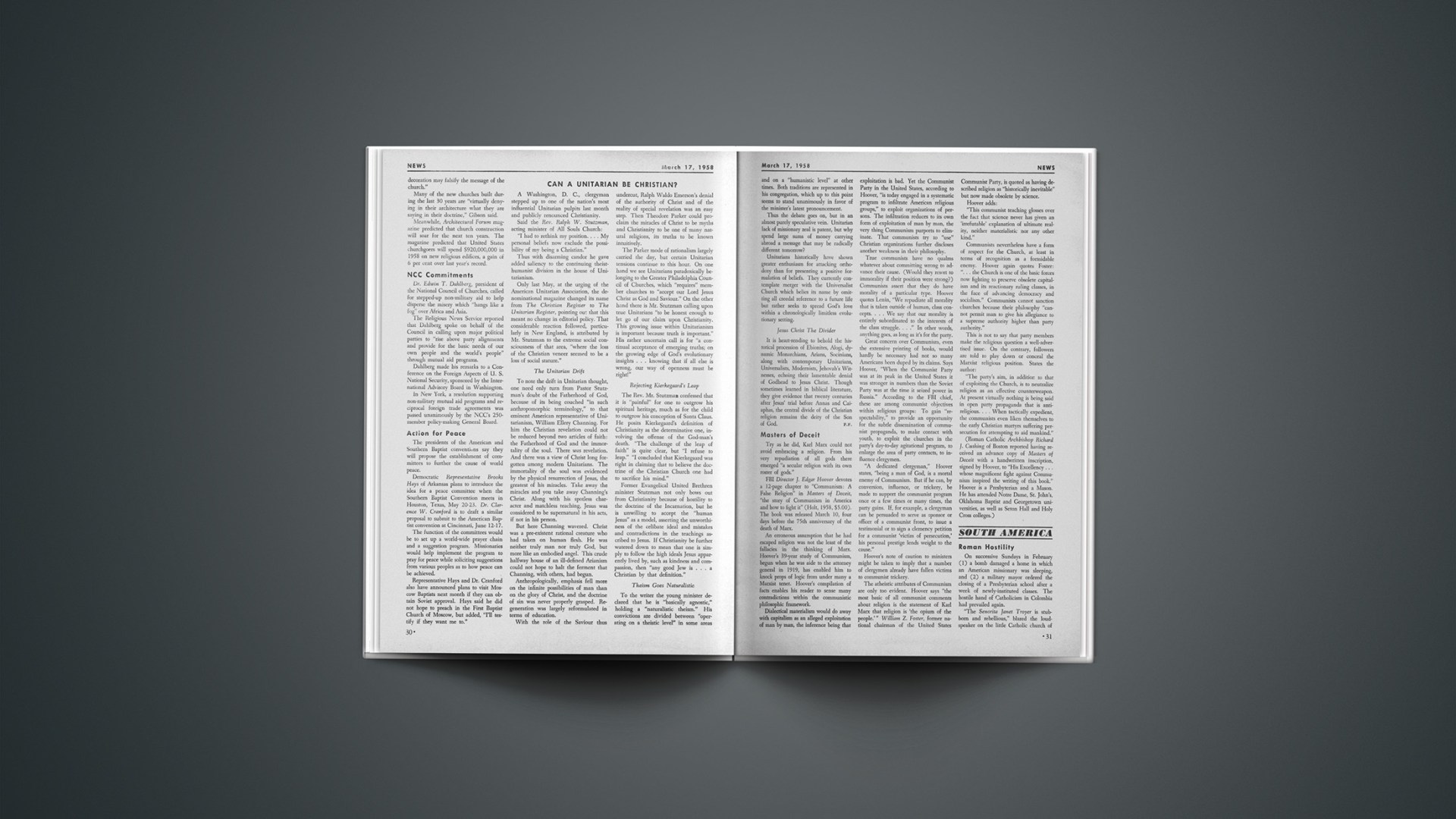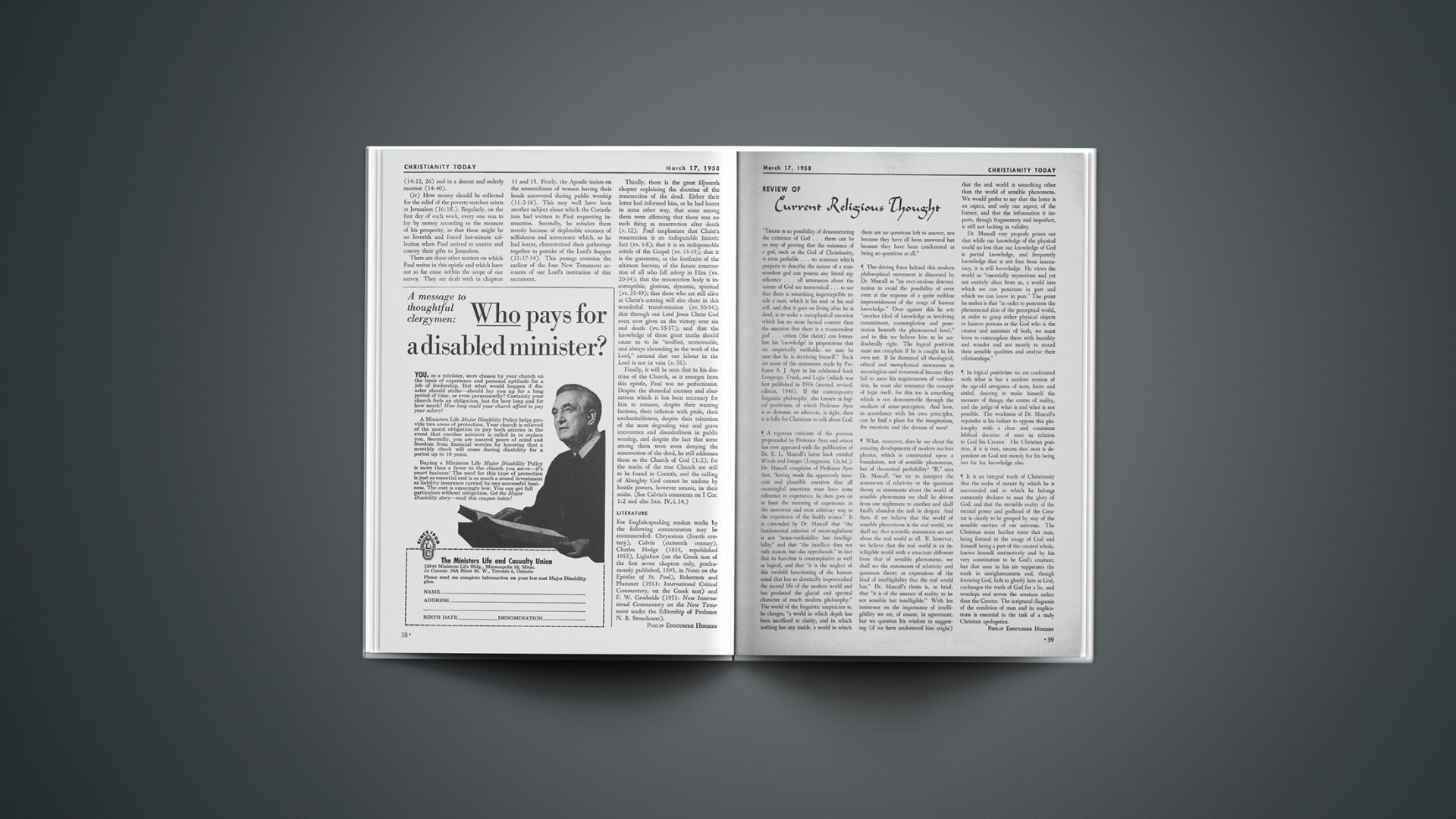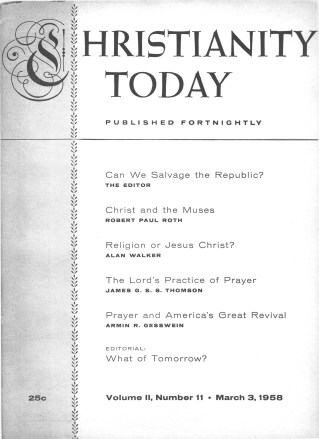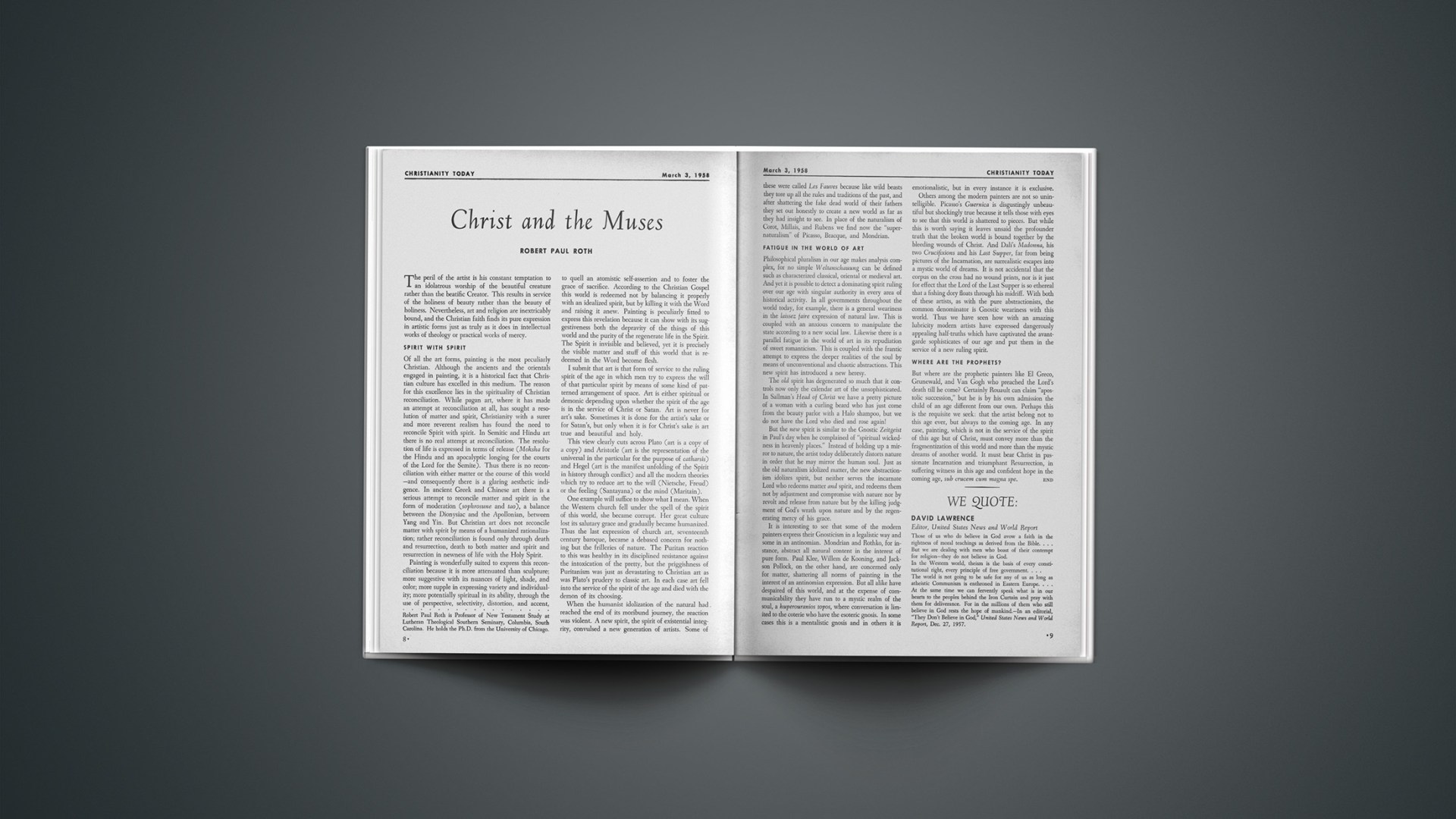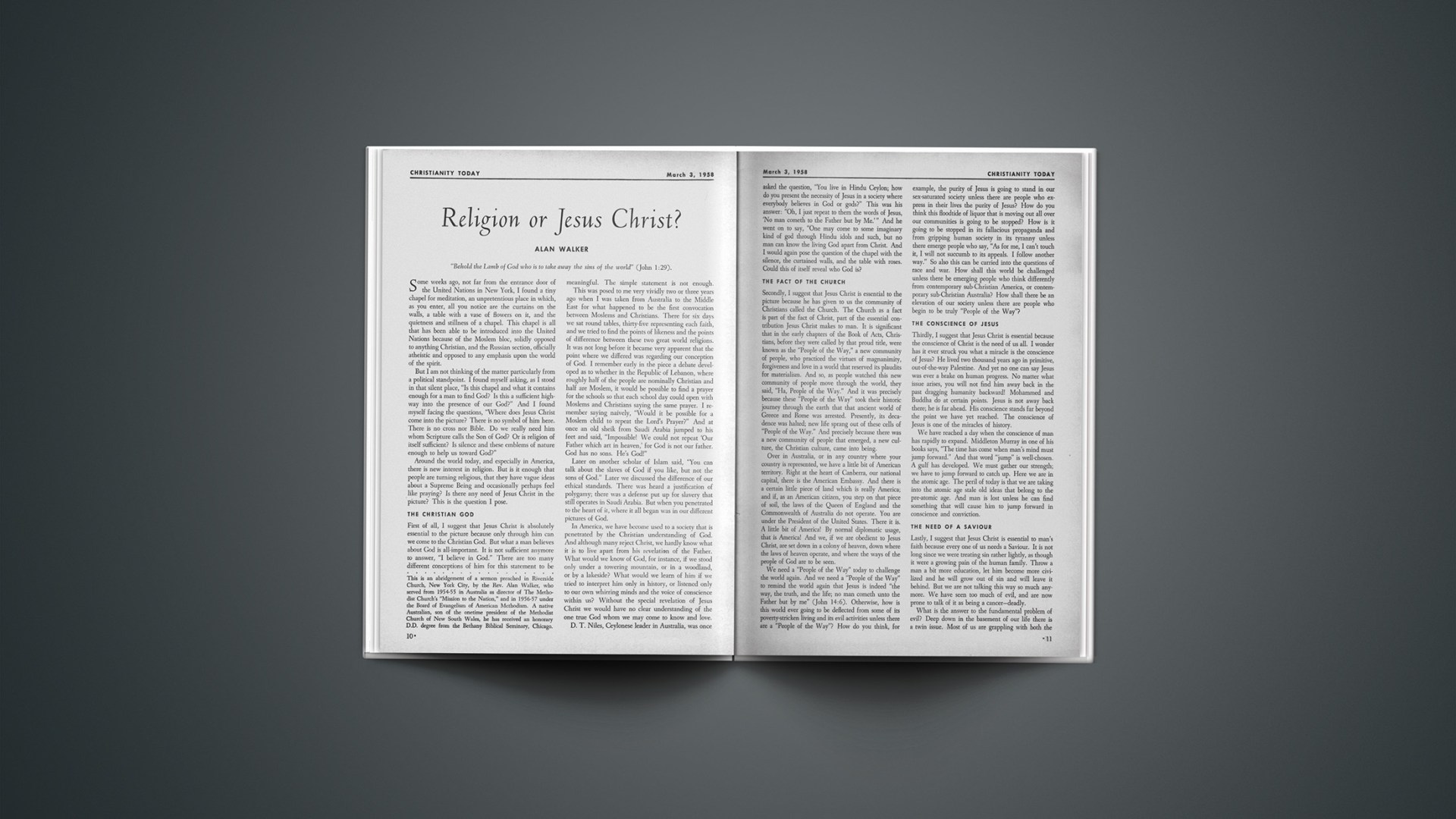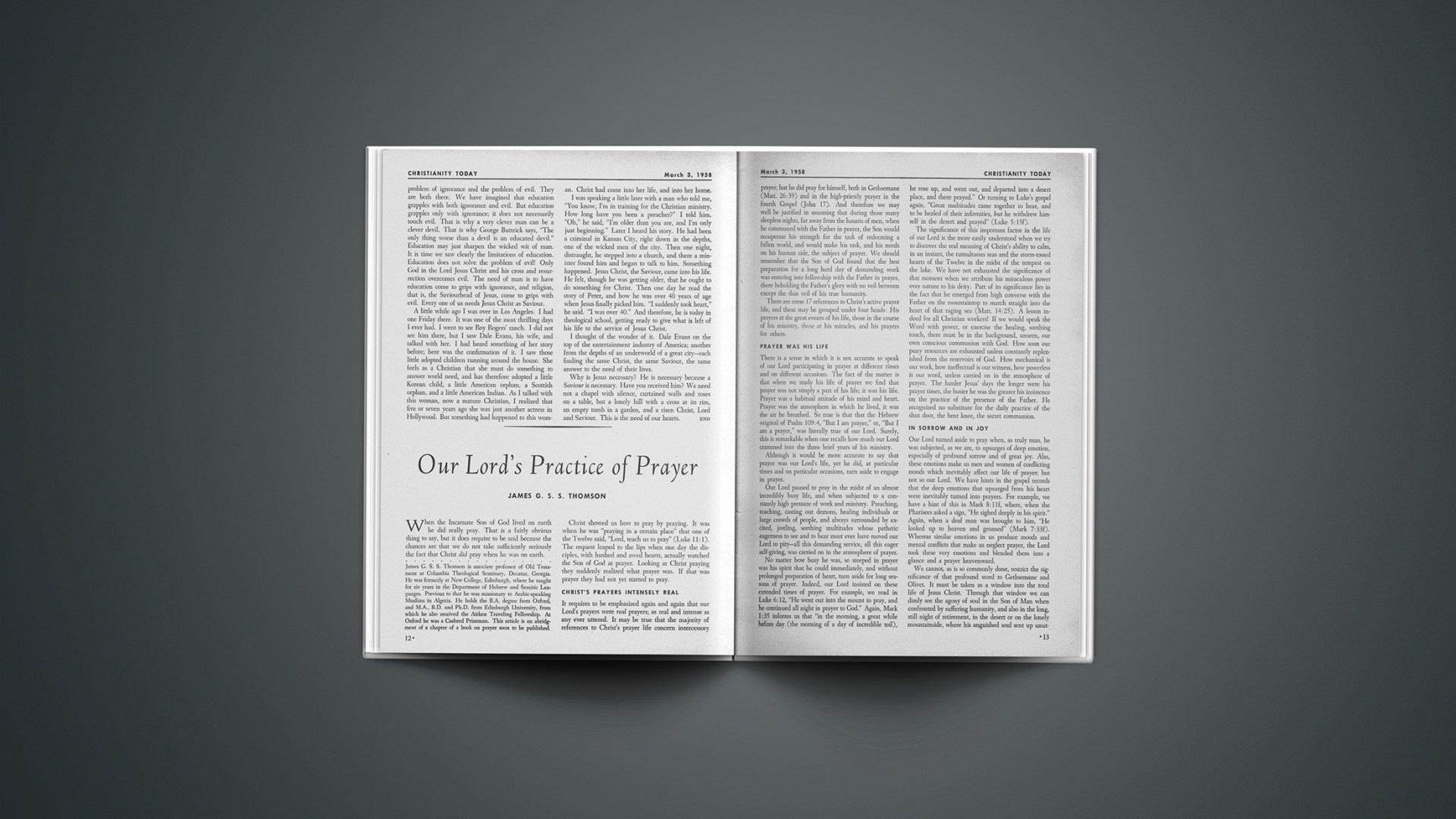THE E-BOMB
Pundits, statesmen and educators have commandeered the little moons as space platforms to lecture us about the scientific revolution. Survival now demands mind-power more than manpower. Only through education, say the educators, can we keep up with the Jonesevitches.
Publicity-minded pedagogues call it the E-bomb. It surely has a critical mass in our metropolitan schools. Is it clear how it helps to have the thing go off? Are the radioactive kids jiving in the new gym part of the fallout? The gang warlord who made his switchblade in the school shop is not well-educated, but would the E-bomb still be a dud if he learned to make a missile?
Even the “vision of greatness” as a neutral educational morality is not promising if the gang known as “The Egyptian Kings” happens to be most attracted to the greatness of Nero, Napoleon, or Nietzsche.
It is no solution, however, for evangelicals to throw rocks through the window walls of progressive education. Our stained glass windows are also vulnerable, especially those of abandoned churches in gangland. Courageous school teachers face young mobsters deserted by the churches in this flight to the suburbs.
A major breakthrough in Christian education is overdue: from the hour-a-week Sunday School (where no saint is more secure than Miss Fixture, whose practiced ineptitude has alienated generations of teen-agers) to a program of Christian nurture joining home and church in a curriculum to remove biblical illiteracy and train servants of Christ.
The Gospel once illumined all higher education in America. Another revival is needed—of Christian colleges, primary and secondary schools. The positive accomplishment of Christ-centered education can show the sweep and relevance of God’s Word. We have a margin of luxury our fathers never knew. Do we have their vision? Even an atomic age cannot match the dynamis of Pentecost!
WORLD GOVERNMENT
Commander Lippincott’s article on “World Government and Christianity” (Feb. 3 issue) should be read by all supporters of the U.N.; then they should read Paul Blanshard’s “Protestant Freedom” in the Christian Herald. Then they might attempt to swallow the Bahai idea of world federalism. Then read the history of the tower of Babel. Then study the history of governments in relation to the Chief Corner Stone which builders did and still reject.…
Monmouth, Ill.
Not only do I think Mr. Lippincott has an improper evaluation of our present United Nations, but his feeling that our lack of majority in the world as Christians means we are not to trust anyone else is also unChristian.… He states that the 800,000,000 Communists (the amount of real Communists I doubt) are all militant atheists. Did he read your article of a copy or two ago concerning the church in Russia? Secondly concerning the 700,000,000 Moslems that they are all anti-Christian. Mr. Lippincott cannot find facts to substantiate his statements. Emanuel Evangelical
United Brethren Church
Huntingburg, Indiana
Does that man know anything about Bible prophecy? It does not look like it.
Berkeley, Calif.
You and the author are to be commended for bringing to your readers some pertinent (but less favorable) aspects, of what, has in the eyes of many, become something of a “sacred cow.”
Lakehurst, N. J.
In the midst of the continuing hue and cry about World Government, Mr. Lippincott’s article seems like a good dose of calming and thought-producing medicine.
There is still another area in which we also need some such kind of medicine! And that is the issue of Church-State relations!…
My reason for raising this question is this: unless the apathetic attitude of the voting public is aroused, we are going to awaken quite soon, to the fact that the “wall of separation” has been quietly removed … not tom down … not demolished … but just quietly picked up and set aside, much in the same manner as some of our other solid American distinctions have been museumed!
The Methodist Church
Chicora, Pa.
UNCERTAIN TRUMPETERS
In recent years I have been considerably disturbed by the uncertainty displayed by some young men and women seeking to be taken under care of Presbytery in view of full-time Christian service, all fine young folks having high ideals and purpose. It would be unreasonable and unfair to expect these candidates to know the answer to some of the perplexing questions voiced by theologians, yet it would seem that there are certain truths, revealed in the Scriptures, upon which there should be no doubts. I refer to the Person of Christ, his sinless life, atoning death, bodily resurrection, ascension, and coming again to reign. Should our Presbyteries ordain any such young people before they have planted the feet of their faith on solid ground? Should we send forth trumpeters whose trumpets have an uncertain sound?
Madison, Wis.
UN AND CHRISTIANITY
If UN gets the power, for which it is striving, and which Christian leadership in our country seems determined to give it, Christianity, much less Protestant Christianity, won’t have a chance, not even a hope.…
Christian Freedom Foundation President
New York City
ICCC MISSIONS
In reference to … “The Drive for IMCWCC Merger” (Sept. 30 issue) I want to convey to you … that in addition to the organizations of mission agencies which you list … there is in existence, The Associated Missions of the ICCC, otherwise alphabetically known as TAM.… The approximate number of missionaries involved … is one thousand and the finances passing through these mission agencies will approximate not less than one million five hundred thousand dollars.…
The Associated Missions has and will continue to take a clear-cut stand with reference to these issues which involve separation from apostasy and refusal to co-operate with the false teaching of modern religious liberalism as represented by both the World Council and IMC.
Associated Missions of ICCC
Cleveland, Ohio
RECESSION POSSIBILITIES
Ministers should be reminded of the tremendous opportunities that a “recession” and “layoffs” afford. It is true that “materially” it is not good, but we dare not overlook … other aspects.
Christian men … affected by layoffs need guidance.… They need to be guided to profitable use of the time that they find on their hands. The reading of the Bible and good books should be encouraged, along with prayer. Also now is the opportunity for the church to utilize this time needed for calling!… It is also a time of “change” when [people] may be more “fluid” and pliable—more receptive to the Gospel or an invitation to hear it.…
Wellington, Ohio
HILLBILLIES AND POETS
Concerning the “Gospel on the Radio.” Sometimes it appears as if the gospel is only for hillbillies and the like.… The hillbillies need saving, but so do Doctors, Lawyers, Professors, Senators, Actors, Authors, Philosophers and Poets.
Alexandria, Va.
GOOD HOPE
CHRISTIANITY TODAY … is one of the most hopeful indications of evangelical life in American Christianity.
Gordon Divinity School
Beverly Farms, Mass.
The fact that extreme Fundamentalists scourge you as being a liar, and extreme Neo’s and Liberals likewise condemn you should be a source of inspiration to you, in that this must be the result of the leading of the Holy Spirit.
Maywood, Ill.
Why not endeavor to be neither ‘Fundamental or Modernistic’ but Christian?… I thank God for Fosdick (Social Reformer) and Graham (Evangelist) both God’s men of our day.
Methodist Church
Grant Park, Ill.
I regard it as a MUST for every minister and Bible student who is willing to remain open and receptive to all the light and strength that better means and methods of Bible study can bring.
Dallas, Texas
